Chicken TNF-α(Tumor Necrosis Factor Alpha) ELISA Kit
SKU: E-EL-Ch0215
Chicken TNF-α(Tumor Necrosis Factor Alpha) ELISA Kit
| Detection Range | 31.25-2000 pg/mL |
| Sensitivity | 18.75 pg/mL |
Product Details
Properties
| Assay type | Sandwich-ELISA |
| Format | 96T |
| Assay time | 4.5h |
| Detection range | 31.25-2000 pg/mL |
| Sensitivity | 18.75 pg/mL |
| Sample type &Sample volume | Serum, plasma and other biological fluids; 100 μL |
| Specificity | This kit recognizes Chicken TNF-α in samples. No significant cross-reactivity or interference between Chicken TNF-α and analogues was observed. |
| Reproducibility | Both intra-CV and inter-CV are < 10%. |
| Application | This ELISA kit applies to the in vitro quantitative determination of Chicken TNF-α concentrations in Serum, plasma and other biological fluids. |
Test Principle
This ELISA kit uses the Sandwich-ELISA principle. The micro ELISA plate provided in this kit has been pre-coated with an antibody specific to Chicken TNF-α. Standards or samples are added to the micro ELISA plate wells and combined with the specific antibody. Then a biotinylated detection antibody specific for Chicken TNF-α and Avidin-Horseradish Peroxidase (HRP) conjugate are added successively to each micro plate well and incubated. Free components are washed away. The substrate solution is added to each well. Only those wells that contain Chicken TNF-α, biotinylated detection antibody and Avidin-HRP conjugate will appear blue in color. The enzyme-substrate reaction is terminated by the addition of stop solution and the color turns yellow. The optical density (OD) is measured spectrophotometrically at a wavelength of 450 nm ± 2 nm. The OD value is proportional to the concentration of Chicken TNF-α. You can calculate the concentration of Chicken TNF-α in the samples by comparing the OD of the samples to the standard curve.
Kit Components and Storage
An unopened kit can be stored at 2-8℃ for 1 month. If the kit is not supposed to be used within 1 month, store the components separately according to the following conditions once the kit is received.
| Item | Specifications | Storage |
| Micro ELISA Plate(Dismountable) | 96T: 8 wells ×12 strips | -20℃, 6 months |
| 48T: 8 wells ×6 strips | ||
| Reference Standard | 96T: 2 vials | |
| 48T: 1 vial | ||
| Concentrated Biotinylated Detection Ab (100×) | 96T: 1 vial, 120 μL | |
| 48T: 1 vial, 60 μL | ||
| Concentrated HRP Conjugate (100×) | 96T: 1 vial, 120 μL | -20℃ (Protect from light), 6 months |
| 48T: 1 vial, 60 μL | ||
| Reference Standard & Sample Diluent | 1 vial, 20 mL | 2-8°C, 6 months |
| Biotinylated Detection Ab Diluent | 1 vial, 14 mL | |
| HRP Conjugate Diluent | 1 vial, 14 mL | |
| Concentrated Wash Buffer (25×) | 1 vial, 30 mL | |
| Substrate Reagent | 1 vial, 10 mL | 2-8℃ (Protect from light) |
| Stop Solution | 1 vial, 10 mL | 2-8℃ |
| Plate Sealer | 5 pieces | |
| Manual | 1 copy | |
| Certificate of Analysis | 1 copy |
Technical Data:
Precision
Intra-assay Precision (Precision within an assay): 3 samples with low, mid range and high level Chicken TNF-α were tested 20 times on one plate, respectively.
Inter-assay Precision (Precision between assays): 3 samples with low, mid range and high level Chicken TNF-α were tested on 3 different plates, 20 replicates in each plate.
| Intra-assay Precision | Inter-assay Precision | |||||
|---|---|---|---|---|---|---|
| Sample | 1 | 2 | 3 | 1 | 2 | 3 |
| n | 20 | 20 | 20 | 20 | 20 | 20 |
| Mean (pg/mL) | 110.23 | 215.17 | 685.07 | 113.81 | 206.36 | 631.63 |
| Standard deviation | 6.14 | 11.27 | 24.94 | 6.70 | 11.78 | 25.58 |
| CV (%) | 5.57 | 5.24 | 3.64 | 5.89 | 5.71 | 4.05 |
Recovery
The recovery of Chicken TNF-α spiked at three different levels in samples throughout the range of the assay was evaluated in various matrices.
| Sample Type | Range (%) | Average Recovery (%) |
|---|---|---|
| Serum(n=8) | 89-102 | 96 |
| EDTA plasma (n=8) | 85-101 | 92 |
| Cell culture media (n=8) | 85-97 | 90 |
Target Information
| Synonyms | DIF, TNF-alpha, TNFA, TNFSF2 |
Assay Procedures
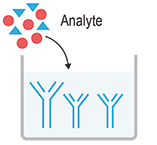 |
1. Add 100μL standard or sample to the wells. Incubate for 90 min at 37°C |
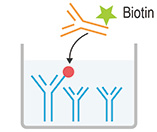 |
2. Discard the liquid, immediately add 100μL Biotinylated Detection Ab working solution to each well. Incubate for 60 min at 37°C |
 |
3. Aspirate and wash the plate for 3 times |
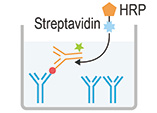 |
4. Add 100μL HRP conjugate working solution. Incubate for 30 min at 37°C. Aspirate and wash the plate for 5 times |
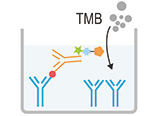 |
5. Add 90μL Substrate Reagent. Incubate for 15 min at 37°C |
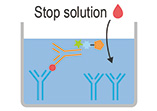 |
6. Add 50μL Stop Solution |
 |
7. Read the plate at 450nm immediately. Calculation of the results |



